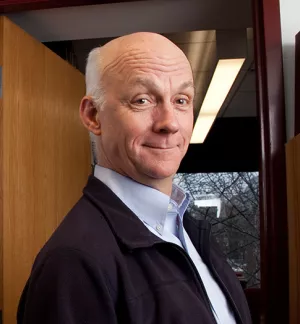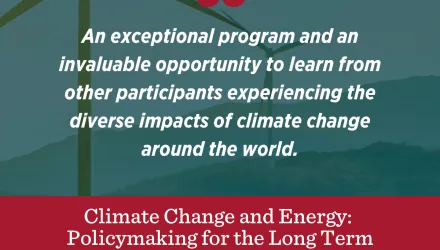From the Harvard University Gazette Online:
"Confronting the need to reduce greenhouse gas emissions and promote sustainability is a paramount challenge not just for Harvard but for people and organizations around the world," said William Clark, the Harvey Brooks Professor of International Science, Public Policy, and Human Development and chair of the task force. "I'm very grateful to my colleagues on the task force for working so hard and so thoughtfully to analyze the science, technology, and changing regulatory and economic environment relating to climate change and to generate a unanimous set of recommendations that can establish Harvard as a leader in this crucial effort. We have a great opportunity and responsibility here. Every one of us in the extended Harvard family has a role to play in seizing it."
In a statement, President Faust praised the task force for its report and outlined a set of substantive intentions and procedural next steps drawing on the report's analysis and proposals. Faust thanked the task force, chaired by Clark and Thomas Vautin, associate vice president for facilities and environmental services, for setting forth an ambitious and far-reaching set of recommendations rooted in the growing scientific understanding of the role played by GHG emissions in climate change.
"Our responsibility to future generations demands that we approach this problem with the seriousness of purpose it deserves and with the cooperative spirit essential to progress," Faust said. "We owe thanks to the members and staff of the task force for their thoughtfulness, resourcefulness, and hard work in pointing us forward on this important set of issues. It is now for all of us to take up the important challenge they have helped to set before us. What is at stake is nothing less than a change in the culture of how we work and live."
In light of the report's recommendations, Faust said that Harvard will pursue a comprehensive program of reducing GHG emissions, including "a long-term strategy intended to achieve continuous improvement in reducing Harvard's GHG emissions at the maximum practicable rate." Consistent with the report's proposals, the University will embrace an "adaptive approach" to the challenge of reducing GHG emissions, involving periodic review of progress and the consideration of short-term goals on a rolling basis. The task force's recommendation of such an approach, Faust said, makes particular sense in view of "a context in which energy costs, available technologies, regulatory requirements, and broader economic realities are shifting so rapidly that predicting the future is difficult and establishing fixed goals becomes challenging." As an initial short-term goal, she said, Harvard will aim to reduce its GHG emissions, including those associated with prospective growth, by 30 percent - relative to its 2006 baseline - by 2016, as the task force recommended.
"The goal we seek to achieve by 2016 is an aggressive one, especially in light of the prospective growth of our campus, and extraordinary efforts will be needed to meet it," Faust said. "We have consciously set a high bar for ourselves, in view of the importance and urgency - as well as the difficulty - of the challenge."
Faust embraced the task force's view that, in pursuing its goal, the University should place its principal emphasis on improving its own operations - by enhancing energy efficiency, reducing the GHG intensity of Harvard's energy sources, and managing demand. The University will also explore the manner and extent to which it can best use and develop high-quality carbon offsets as part of its GHG reduction efforts. More broadly, Faust stressed the importance of seeing GHG reduction efforts within the context of wider sustainability concerns, and of building on the University's growing research and educational efforts directed at confronting the challenge of climate change.
The Council of Deans will devote a portion of its summer retreat to discussing the strategic framework for Harvard's GHG reduction efforts, Faust said, and the University's Administrative Council will take up the issue at its next meeting. She added that it will be one of the first priorities of the University's new executive vice president, Ed Forst, to convene a working group to chart a concrete implementation plan for GHG reductions. In addition, Harvard will plan a fall launch event to focus the University community's attention on the imperative of reducing GHG emissions and strengthening its larger commitment to environmentally responsible practices.
The new GHG reduction program marks the latest in a series of steps the University has taken over the past two decades to promote environmental sustainability. In the last decade, for example, Harvard has established the Harvard Green Campus Initiative to support sustainability efforts across the University, has achieved a recycling rate of more than 50 percent for the Cambridge and Allston campuses, and currently has one of the highest number (47) of construction projects registered with the U.S. Green Buildings Council, including the renovation of the Blackstone office building, which achieved LEED platinum status, the highest level certification. The University has also recently begun piloting numerous sustainable projects to test their effectiveness and feasibility, including the installation of rooftop solar systems to produce hot water, installing low-flow water fixtures in 3,000 units of graduate housing to conserve water and reduce the amount of water-related gas and electric energy by approximately 40 percent, and serving more produce and vegetables from regional farms in its dining halls.
"One of our primary goals in the Blackstone office renovation project was to learn and demonstrate how well sustainable design and construction techniques can be applied even to historic buildings," said Vautin, the vice chair of the task force. "Soon we will be installing a new steam turbine at the Blackstone steam plant that will produce electricity at more than double the efficiency of a conventional power plant, providing up to 10 percent of Harvard's power to its buildings during winter months.
"Across the campus, our facilities managers have many examples of how we can reduce our carbon footprint in a cost-effective way when we approach sustainability as an integral part of how we operate," Vautin added. "Our challenge now is to create a culture across the entire Harvard community in which our progress becomes systematic. We can achieve great energy efficiencies, and do a great deal of good for the future of the planet, if we embrace the challenge with determination and creativity."
Sustainability has already emerged as a fundamental consideration in planning for the University's expanded campus in Allston. The Allston Science Complex, for example, is being designed to produce only half the greenhouse gas emissions of a typical laboratory building that meets national standards, making Harvard the first in the nation to voluntarily agree to legally bind a developer to reducing greenhouse gases beyond the current standards.
Additional information on Harvard's broad array of sustainability efforts can be found on the Web site of the Harvard Green Campus Initiative.
Both the task force report and Faust's statement emphasize the distinctive role that universities can play in addressing issues of climate change and sustainability through research and education.
"Harvard's potentially greatest contributions to solving the problem of climate change should reach far beyond our actions to limit GHG emissions arising from our own campus operations," said Faust. "Our research and teaching must generate knowledge about how we, not just at Harvard but across the United States and around the world, might use the discoveries of science, of technology, and of policy analysis to create a sustainable environment for generations to come. There can be few more compelling examples of what I have called universities' 'accountability to the future.'"
Clark, William and John P. Holdren. “Report of the Harvard University Task Force on Greenhouse Gas Emissions.” July 9, 2008
The full text of this publication is available in the link below.







